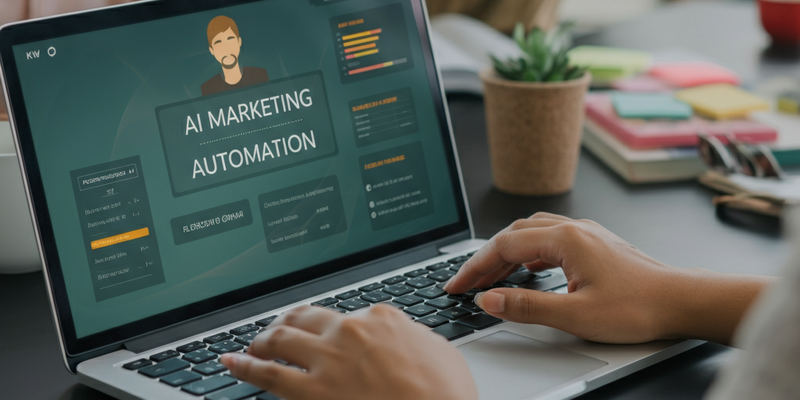How HubSpot's AI Features Automate Personalization at Scale
Personalization is no longer a luxury in modern marketing—it's an expectation. In today's fast-paced digital world, customers demand tailored...
I know what I am looking for, and would like to chat.
A team of data-driven marketers obsessed with generating revenue for our clients.
Because the proof is in the pudding.
At Campaign Creators we live by three principles: Autonomy, Mastery, Purpose.

The way businesses connect with their customers has changed dramatically in the past decade. What once relied on cold calls and generic advertising has now evolved into a highly personalized, data-driven experience. At the heart of this evolution is one of the most powerful tools of the modern era: marketing automation. But this isn’t just any marketing automation—it’s automation supercharged by Artificial Intelligence (AI).
AI-powered marketing automation is a game-changer in every sense of the word. These tools handle repetitive tasks and anticipate customer desires. Imagine crafting campaigns that speak directly to an individual’s needs, interests, and behaviors—all without the guesswork.
AI doesn’t just amplify what automation tools can do; it transforms them entirely. It enables businesses to gather insights from vast amounts of data, spot trends that humans might miss, and predict future customer behavior with startling accuracy. It’s not just about targeting anymore; it’s about understanding your audience on a deeper level and responding to their needs before they even articulate them.
This comprehensive guide will take you on a deep dive into the world of AI marketing automation, showing you how it’s transforming the way businesses interact with their audiences. You’ll learn how these advanced tools can help you streamline operations, deepen customer relationships, and unlock sustained growth.
Many businesses still rely on outdated legacy marketing automation tools, only to encounter many automation challenges that impede growth and efficiency. With restricted functionality, cumbersome interfaces, and poor integration with modern platforms, these tools often fail to keep up with the demands of today’s fast-paced, data-driven marketing environment.
Here are a few challenges of clinging to outdated traditional marketing automation techniques and tools:
Traditional methods lack the agility to adapt to customers' ever-changing needs in real-time. This rigidity often leads to missed opportunities. AI-powered marketing automation offers dynamic, cutting-edge capabilities that were once beyond reach.
AI in marketing automation represents a paradigm shift in how businesses engage with their audiences. By leveraging machine learning, predictive analytics, and personalized recommendations, AI empowers marketers to move beyond reactive strategies and adopt a proactive, data-driven approach. This transformation not only maximizes efficiency but also ensures campaigns resonate on a deeper level with target audiences.
AI-driven marketing automation takes traditional tools to the next level by integrating machine learning, natural language processing (NLP), and predictive analytics. This powerful trio doesn’t just execute predefined tasks—it learns from data, adapts to changing trends, and optimizes processes on its own. Imagine a system that grows smarter over time, delivering sharper insights and more effective campaigns with minimal effort. It’s not just automation—it’s intelligent optimization in action.
Think of it as automation with intelligence; AI doesn’t just perform tasks, it drives smarter strategies and better outcomes.
AI marketing automation tools are revolutionizing how businesses connect with their audiences. Blending advanced analytics with intelligent decision-making goes beyond mere efficiency, unlocking opportunities for personalization, agility, and foresight in every campaign. This isn’t just a tool; it’s a game-changing strategy that empowers marketers to stay ahead in an increasingly competitive landscape.
Harnessing AI-based marketing automation tools unlocks unparalleled advantages for businesses:
AI empowers businesses to create highly personalized content, offers, and experiences for individual users, even when managing large audiences. With predictive algorithms, it analyzes user behaviors, purchase history, and preferences to deliver hyper-relevant messaging. This technology ensures every interaction resonates, helping businesses connect with customers on a deeper, more meaningful level.
AI-automated marketing uses historical data and behavioral trends to predict future outcomes, giving businesses a competitive edge. Imagine being able to:
With AI, you can move from reacting to planning ahead with confidence.
AI streamlines the process of scoring leads by analyzing behavioral and demographic data, helping businesses prioritize the most promising prospects with precision. Beyond just scoring, AI actively nurtures leads by delivering timely, personalized, and context-driven content, keeping potential customers engaged and increasing the chances of conversion. Marketing automation using AI is a smarter, more efficient way to turn prospects into loyal customers.
AI takes multi-channel marketing to the next level, seamlessly managing efforts across email, social media, and web platforms. With AI-driven algorithms, it doesn’t just automate tasks—it analyzes data to decide the best platform, timing, and messaging to engage each customer. By delivering smarter, more personalized outreach, marketing automation with AI ensures your efforts are both efficient and impactful.
Unlike traditional tools, AI doesn’t just set campaigns and let them run—it actively analyzes and improves them in real-time. Powered by machine learning, it continuously adjusts ad placements, refines messaging, and optimizes segmentation strategies to ensure every dollar spent drives maximum ROI. With AI, campaigns become smarter, faster, and more effective as they go, giving you the competitive edge you need.
AI takes the burden of repetitive manual tasks off marketers' shoulders, giving them more time to focus on strategic, high-impact decisions that drive growth. It doesn’t stop there—AI also maximizes efficiency by intelligently allocating resources to the best-performing channels and campaign elements, ensuring every dollar delivers results.
By incorporating these AI-driven benefits, businesses gain a competitive edge in delivering both operational efficiency and exceptional customer experiences.
While AI's benefits are undeniable, successfully implementing it requires careful planning and strategic steps to unlock its full potential.
Here’s how to start:
AI thrives on quality data, but not all data is created equal. Start with a thorough data audit to set your AI initiatives up for success. Make sure your data is:
Remember, strong data isn’t just a resource—it’s the backbone of any successful AI implementation. Take the time to refine it, and your AI will deliver insights that drive real impact.
Not all AI tools are created equal, and choosing the right AI tool can make all the difference in driving your business forward. Here’s what to keep in mind:
Leading platforms like HubSpot’s AI-driven tools are transforming how businesses connect with their audiences. The right AI platform doesn’t just automate—it empowers your team to deliver smarter, faster, and more impactful marketing.
It’s easy to feel the urge to completely overhaul your strategy overnight when adopting AI, but taking a phased approach can make all the difference. Rolling out AI step-by-step helps minimize disruptions and ensures smoother integration. Start small with pilot projects, such as personalized email campaigns or customer segmentation, where the impact is immediate and measurable. As you see results, you can confidently expand your efforts, unlocking even more potential for your business.
Successful implementation isn’t just about adopting new technology—it’s about equipping and empowering your team to use it effectively. By investing in workshops, online courses, and expert-led training, you can ensure your team has the skills and confidence to fully harness the potential of AI. Empower your people, and watch your technology—and your business—thrive.
Despite their relative independence, AI tools require ongoing monitoring and optimization to ensure maximum efficacy and stay one step ahead. Use these tips to keep your AI marketing automations on track:
Businesses can harness AI’s power effectively and ensure a smoother transition by being methodical.
Implementing AI in marketing offers immense potential, but it’s not without its hurdles. To truly unlock its capabilities, businesses must proactively address challenges while adhering to ethical principles. This balance is critical to building trust, safeguarding data, and driving sustainable results in an increasingly competitive landscape.
AI recommendations should always be transparent, fair, and explainable. When businesses prioritize ethical AI practices, they not only foster trust but also create stronger, lasting relationships with their customers. In today’s competitive market, putting ethics first isn’t just the right thing to do—it’s a powerful way to secure loyalty and stand out from the crowd.
AI is just beginning to revolutionize marketing, but future developments are bound to amplify its impact:
Take inspiration from organizations already successfully leveraging AI:
The horizon for AI marketing automation is limitless, making now the ideal time to adopt and experiment with this technology.
AI-driven marketing automation represents the ultimate blend of strategy and technology. It transforms how businesses operate by simplifying complex processes, improving personalization, and delivering measurable results. However, successful implementation requires the right tools, a solid data foundation, and a forward-thinking mindset.
Need help navigating the complexities of AI in marketing? At Campaign Creators, we specialize in equipping businesses with the tools and expertise to leverage AI within HubSpot effectively. From strategy creation to full-system integration, our team is here to guide you every step of the way.
Schedule a free consultation today and take the first step toward AI-powered success.

Personalization is no longer a luxury in modern marketing—it's an expectation. In today's fast-paced digital world, customers demand tailored...

Once considered a futuristic concept, AI is now a critical tool for marketers, revolutionizing the way businesses engage with audiences, craft...

Automation has been a game-changer for marketing, sales, and operations for years, but we’re stepping into a new era. Enter HubSpot AI agents, the...